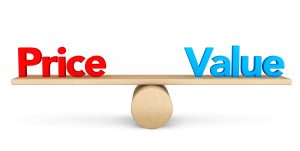Valuation Considerations in Selling a Business
The most important tool in helping evaluate cash flow and risk is good accounting records. If the business has five or more years of good accounting records, the buyer’s perception of risk is reduced, because the records will tell the story of the company’s cash flow, and make it easier to project future cash flow.
 It is unlikely that any single action will result in a significant increase in cash flow, but the here are some areas where improvement may be achieved:
It is unlikely that any single action will result in a significant increase in cash flow, but the here are some areas where improvement may be achieved:
Expense Reductions – Review your financial statements line by line. Can the company operate with less payroll? Fewer vehicles? Can you reduce your space and related rent expense?
Have employee contributions to health insurance costs kept up with rising premiums? I once assisted with a business sale in which the owner’s mantra was “find an expense reduction or become one.” Every dollar that is added to the bottom line may increase the value of the business.
Revenue Increases – Can the customer base be expanded? How will the company’s market share be affected by a price increase? What about a price decrease? Can the company take on new product lines?
Accounts Receivable – Can customer payments be accelerated? Money that is not in accounts receivable will be in your bank account, available for the business to use. For example, a business that has $10 million of annual sales will gain approximately $385,000 of cash by reducing its average collection period by 14 days.
Inventory – Are you carrying obsolete or slow moving inventory? If so, it should be sold at a discount to reduce inventory and raise cash. This step is also necessary so that prospective buyers of the business will have an accurate picture of normal inventory levels.
Common risk factors
Although different businesses may have different risks factors, some risks are common to all businesses. In evaluation of risk, we identify factors that may cause cash flow to not be received in the amounts expected and when expected. Following are some risks common to many businesses:
Customer Concentration – Is the business dependent on sales to one or a few customers? What would happen if one or more of those customers were lost?
Supplier Concentration – Are business operations dependent upon one supplier? If that supplier ceased to exist, could it be replaced?
Key Employees – Do the key employees have employment agreements and/or non-compete agreements? If not, and they went to work for a competitor, would the business suffer?
Obsolescence – Are your products or the processes used to produce your products approaching obsolescence, or are you updating your products and processes to stay competitive?
To understand the value of the business and how to increase it, a business owner considering selling should have the business valued. This will help him understand the factors that drive the value of the business. If this is done long before the contemplated sale, this will give the owner and management team more time to make the changes necessary to increase the value of the business.
For more about business valuation, read the posts, “Why You Need a Business Valuation,” and “Goodwill and Your Business.” Also visit the KRS Business Valuation and Litigation Support page.



